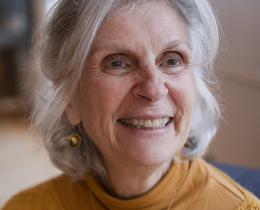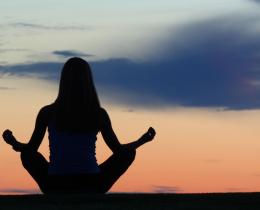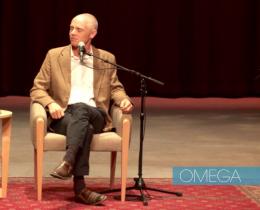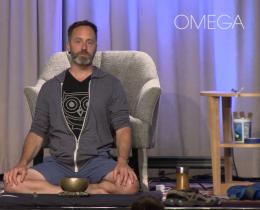Omega: Can we be mindful or present without knowing it, or is it something we need to practice?
Florence: At its core, mindfulness is the innate human capacity to be aware. All human beings come with this capacity to know what’s happening as it’s happening, but we are not trained to access that capacity. It takes continuity and discipline to access what’s already here. This capacity to be aware requires you make a choice to be awake in the present moment with whatever is showing up.
Most of us have had moments of engaged attentiveness: being aware of the feeling of temperature on your cheeks as you go for a walk, being with a loved one and really being present as you look into their eyes, or being aware of the feeling of water as you drink it. We know what it feels like to have moments of really being there, allowing our experience. It’s not about making it a nice experience because you may be feeling anger, discomfort, or pain—it's about being present with whatever is happening that gives you strength to bear the rough waters.
Mindfulness isn't just about attention; it's not a kind of clinical focus of the mind. In most Asian cultures, mindfulness is also translated as heartfulness. It’s a way of being. It's embracing a way of being that’s aware moment to moment to moment.
To establish a formal mindfulness practice, it’s really helpful to choose to do it for a specific amount of time every day. You could choose to practice it by doing a body scan, sitting meditation, walking meditation, or mindful movement. It's not so much about what you choose as it is about the regularity and the quality of intention and attention that you bring to what you do.
For example, thinking about exercise doesn’t do much for you, but lifting weights with some kind of regularity builds strength. Mindfulness is not different from any other talent or skill that requires daily practice. Once you have an intentional daily practice, the spontaneous, informal experience of mindfulness arises more naturally.
Omega: Where do you see the mindfulness movement in 50 years?
Florence: I believe we are experiencing a renaissance where people want to discover what’s always been here—presence. There are many people throughout history who knew it, who were in touch with it, but they didn't popularize it in the way that mindfulness as a practice is popular now. When something becomes popular, it can quickly be scooped up, commercialized, and delivered as a shallow, instant fix. You can say, “Now, get into a mindful state,” but it's just language. The idea of this being a technique to fix something concerns me.
I think it’s good that more people are aware of mindfulness itself, but they often don't realize that this is about one’s life. And your life deserves the attentiveness, care, and love of continuity of years of practice. You can experience some benefits quickly, but to keep growing and deepening you need to keep practicing. We live in a very instant culture, and I feel that the urge to go shallow and fast may, in the long run, be problematic.
In 50 years, I would love to know that mindfulness has touched millions of lives. I would love to see it represented in education, politics, government, medicine, health care, and social systems. If it’s really communicated with depth, we have a chance for greater awareness and greater compassion. We have a chance for a greater awakening in all of these fields of human endeavor. Mindfulness can benefit all of us across our complete lifespan—from prenatal to palliative care.






